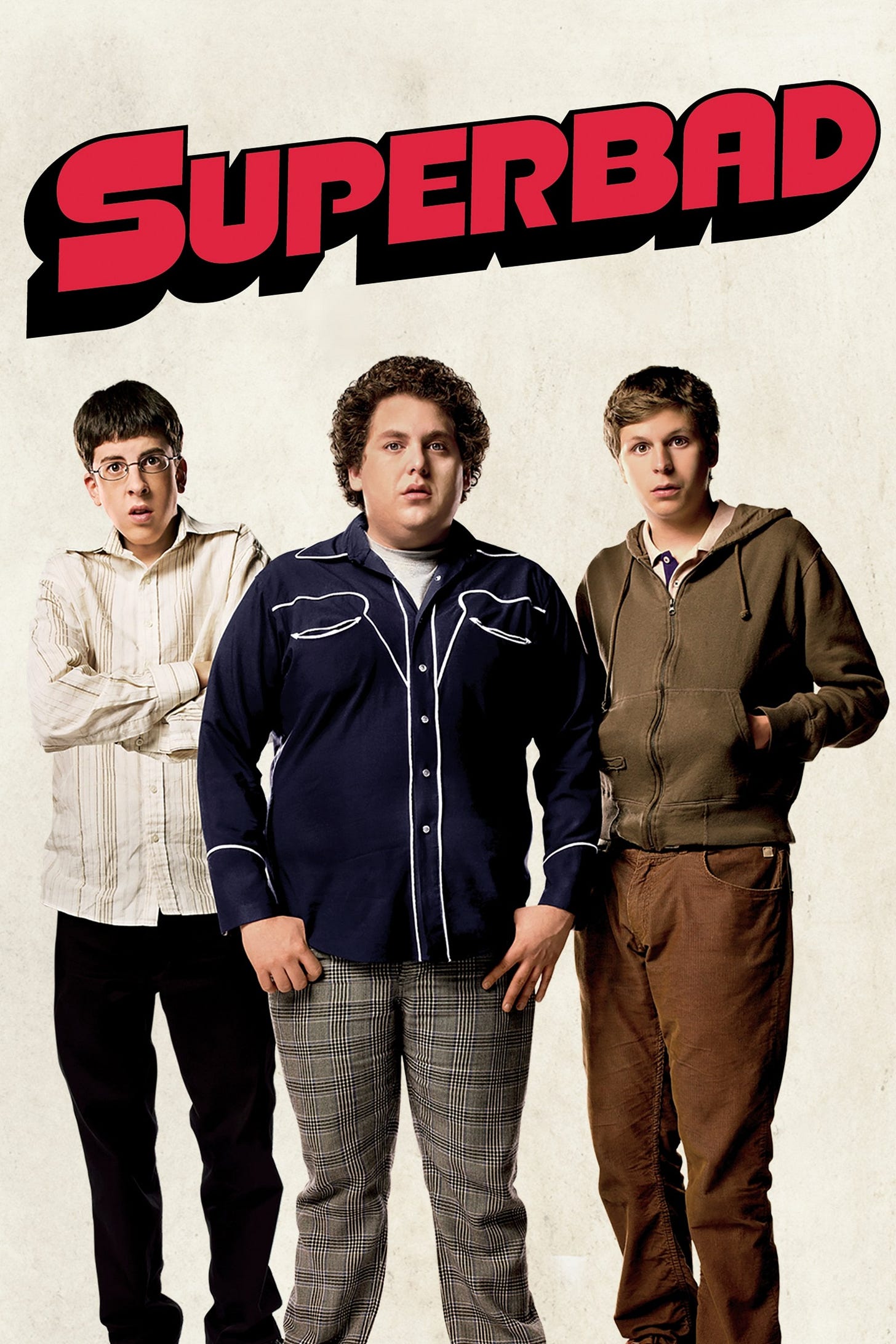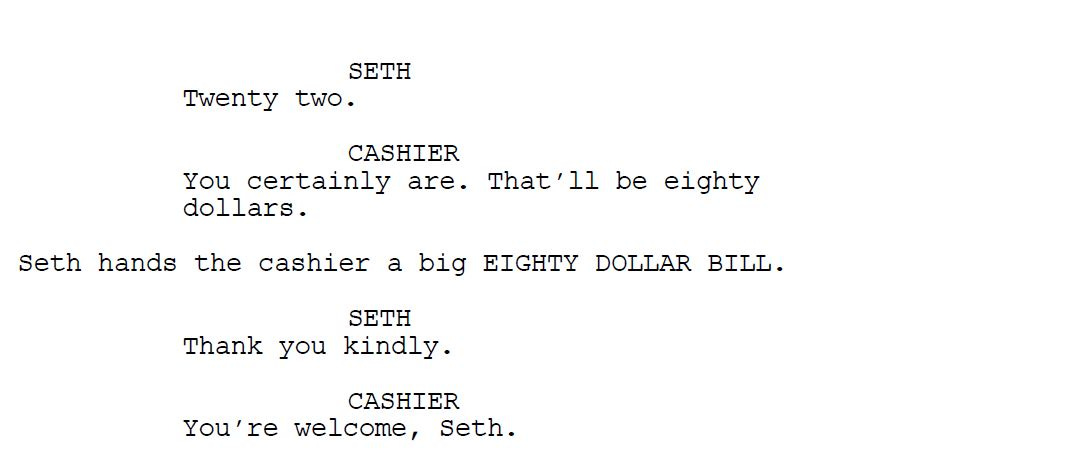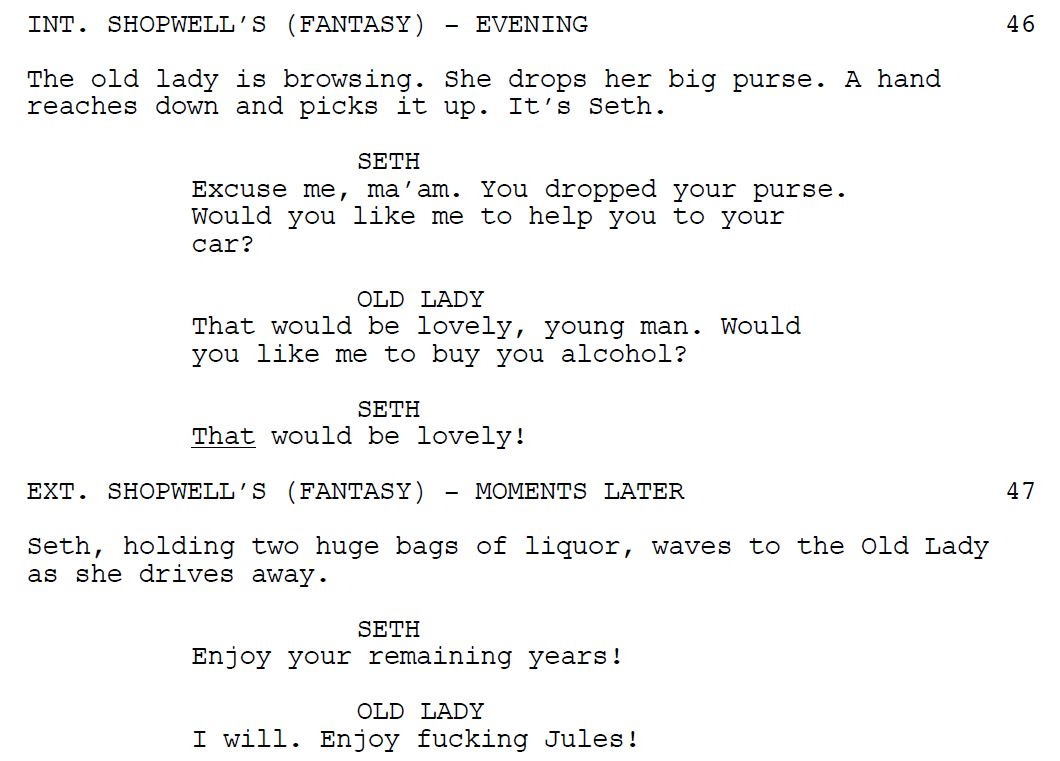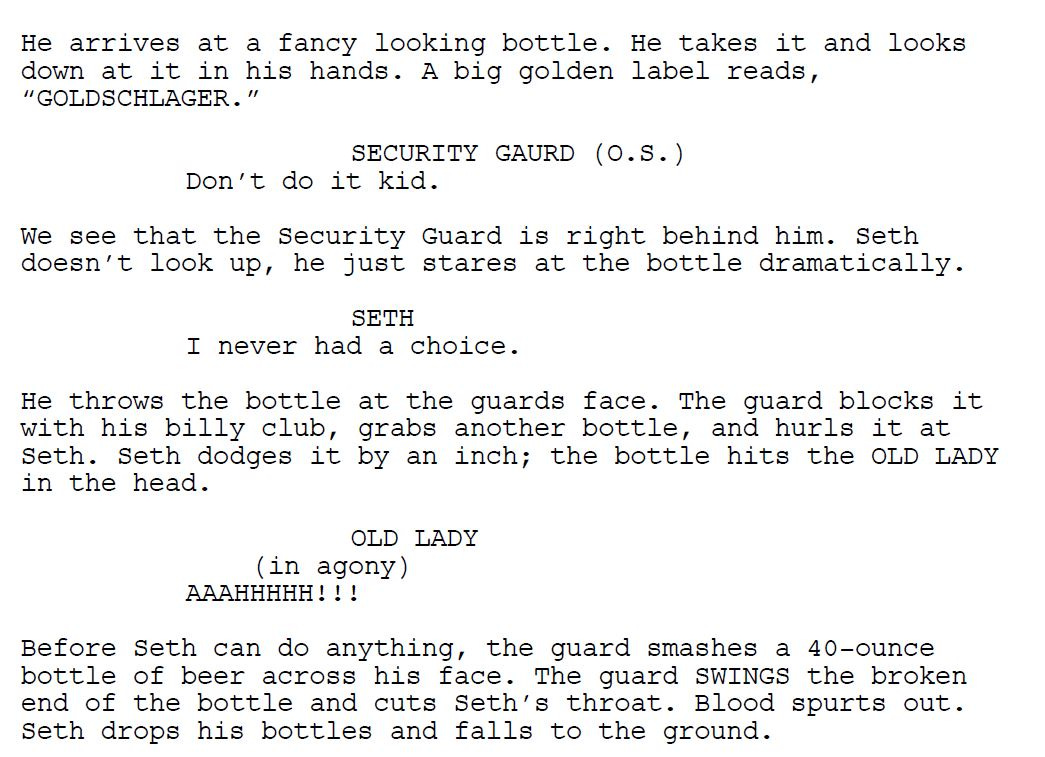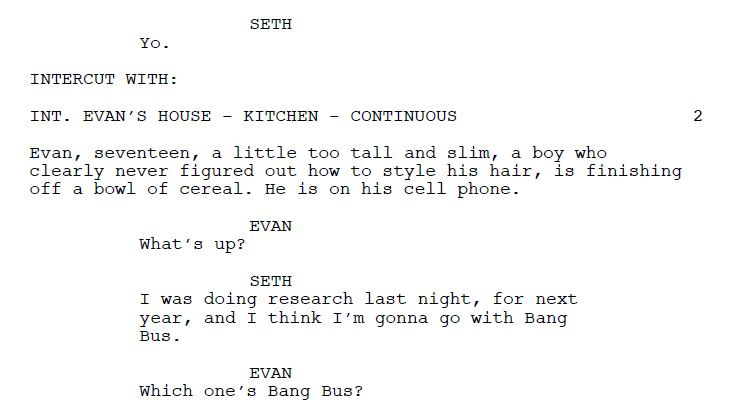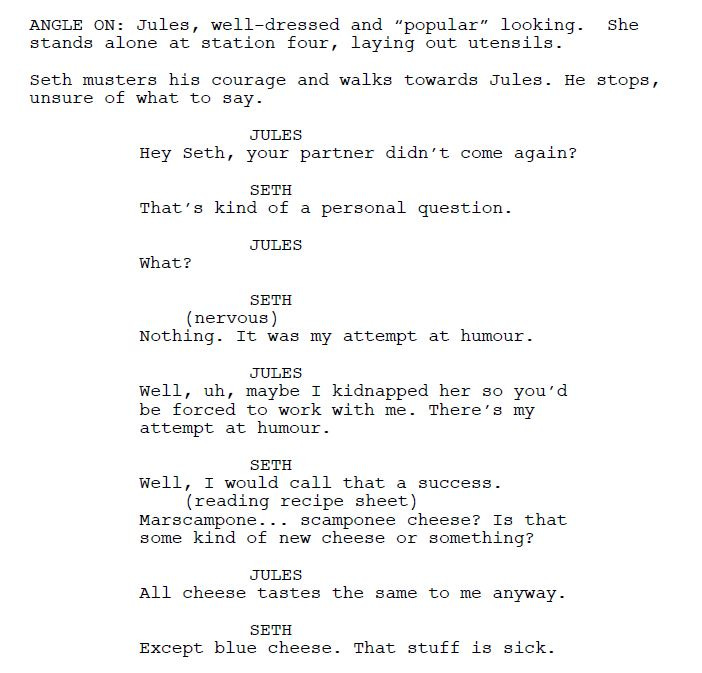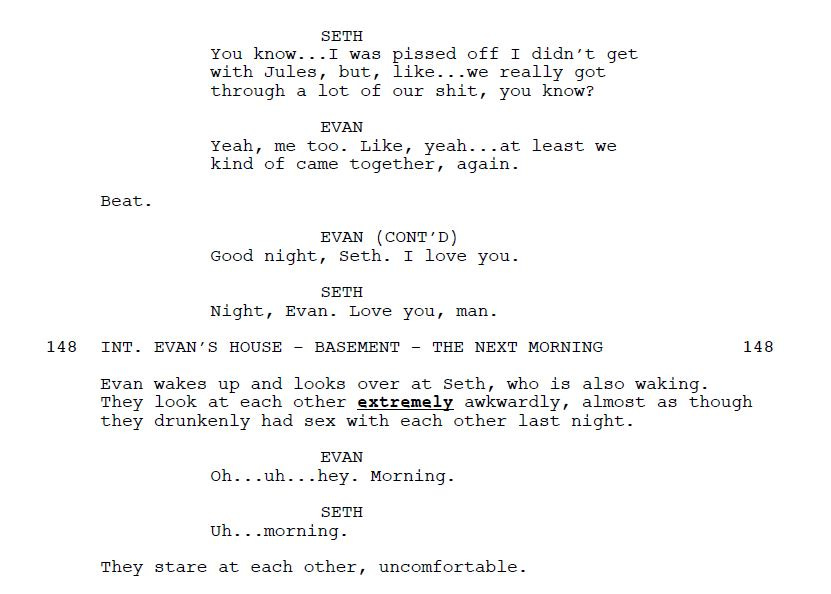Superbad (2007) Script Review | #88 WGA 101 Greatest Scripts of the 21st Century
Seth Rogen and Evan Goldberg successfully capture what it feels like to be sixteen- anxious, awkward, and eternally horny- in this comedy about two best friends (and a third) on the cusp of adulthood.
Logline: Two co-dependent high school seniors are forced to deal with separation anxiety after their plan to stage a booze-soaked party goes awry.
Written by: Seth Rogen and Evan Goldberg
Pages: 114
Number of scenes: 151
There is a timeless quality to Superbad, and that is in the way it nails the anxiety of separating from your best friend as you grow up. By making this the spine of the screenplay, Superbad endures even a decade later; though it doesn’t hurt that it’s also extremely funny.
The premise is ridiculously simple: Seth and Evan, two high school seniors preparing to graduate and grappling with the notion that they will not be attending the same college, go to absurd lengths to get booze for a party in the hopes of impressing and maybe even hooking up with their crushes. Naturally, it does not go the way they hoped, and tests their friendship under the strain.
Who are the characters in Superbad?
Here are the main characters in Superbad, and how they are described in the screenplay:
Seth – “seventeen, a bit heavyset, in the midst of a sad attempt at growing a goatee and clearly a terrible driver.”
Evan – “seventeen, a little too tall and slim, a boy who clearly never figured out how to style his hair.”
Fogell – “one of those seniors who looks like he’s thirteen years old.”
Jules – “well-dressed and ‘popular’ looking.”
Helen – “She‘s a very tall girl and is athletic in a sexy way” (In the film, Helen’s name is changed to Becca, although her best friend is named Becca.)*
Officer Slater – “30 and experienced.”
Officer Michaels – “25 and learning.”
Nicola – “an incredibly hot girl who exudes sexual vibes and looks a little skanky.”1
What is the plot of Superbad?
Lots of screenwriting advice talks about having A-plots and B-plots, where the latter thematically supports the former, but it’s always easier to understand it when you see it in action; Superbad illustrates this surprisingly well.
The A-plot: Seth and Evan try to find booze to bring to Jules’ party so that they can look cool and get together with the girls they like.
The B-plot: After an attempt to buy booze with his fake ID goes wrong, Fogell hangs around with Officer Slater and Officer Michaels, develops a little confidence in himself, and even succeeds in getting laid while Seth and Evan don’t. Fogell is a representation of how going a different path isn’t always scary and can actually benefit.
Compared to even the best high school movies on the market, there is an authenticity and sweetness to Superbad rivaled perhaps only by Freaks and Geeks, a show that Rogen appeared on. No offense, John Hughes, but Rogen and Goldberg are able to capture that authenticity of what it’s like to be sixteen, anxious, and horny all the time, while delivering a stream of jokes that will make you laugh or cringe, sometimes both at the same time, and make its characters three-dimensional, too. Perhaps this is due to having started working on this script when they were at that age.
It also opens with Seth and Evan discussing porn and ends with them each accompanying the girls they like; they may not have had sex, but the reality of Jules and Helen is better than their porn fantasies.
Who are Seth Rogen and Evan Goldberg?
Although it’s not autobiographical, writers Seth Rogen and Evan Goldberg drew from their own experiences and incorporated anecdotes they’d heard into their screenplay; hence why the characters are named after their creators. They started writing Superbad as far back as the late 1990s, when they were still teenagers at Point Grey Secondary School in Vancouver. You know the old writing adage about writing what you know? That’s what Rogen and Goldberg literally did! They even named the third man of their group after their real friend, who is also named Fogell!
The first draft of Superbad had uninspired if amusing origins: Having watched a terrible movie, Goldberg and Rogen declared that they could do a better job, so they went to Goldberg’s sister’s room, where the computer was, and began writing on Word. Over the years, the fundamental idea would remain intact- guys trying to buy beer- but as their writing matured, so did the script.
It would take nearly a decade for the script to get made, during which time Rogen also appeared on the short-lived series Undeclared, as well as features like Donnie Darko and Anchorman: The Legend of Ron Burgundy. Despite his later leading roles, Rogen has always considered himself more as a writer than an actor, but the experience of being in front of the camera no doubt turned him into a better writer, reflected in their subsequent drafts unearthing the emotional core behind the shenanigans; Superbad became a sweet paean to friendship, capturing the fear of starting a new phase of your life without your best friend, instead of being a series of sex jokes running for 120 pages instead.
In 2004, Rogen and Goldberg landed writing positions on Da Ali G Show, where they were part of the team that earned a Primetime Emmy Award nomination. By this time, producer Judd Apatow had taken the duo under his wing, often tasking them with ridiculous writing tests such as turning one of his ideas into a movie in 10 days (even though nothing would come of it by the end of it), or come up with 100 one-page-long ideas for movies (they wrote 50). Although it sounds bizarre, this kind of training sounds like a crash course in screenwriting; especially for two Canadian writers without formal training.
What is the writing style in Superbad?
Film is a visual medium, and as screenwriters, it can be easy to forget that sometimes especially in comedy; Rogen and Goldberg don’t. It starts off by literally using blaxploitation-style credits as a setup to a joke where the main characters are the opposite of cool:
Later, on pages 33-34, they deploy three sequences where Seth fantasizes three different outcomes of trying to buy alcohol without a fake ID…
… with each one becoming more ludicrous…
… than the other.
There is also an interesting lesson here to be learned about how to open a conversation. Look at the first two lines of dialogue in Superbad:
Now “Yo” and “What’s up?” are exchanges that people use in real-life; I use them all the time. But a movie is not reality. Even though this bit captures how teens talk in real life, this could have gone downhill extremely fast if Seth didn’t segue immediately into a bit about porn. The reason I want to highlight this is because aspiring writers DO may be tempted to open a dialogue with “Yo” and “What’s up?” in an aim for authenticity. If you do, DON’T follow it up with “Nothing much.” Jump immediately into whatever it is that needs to be said. Let it be a setup for the real stuff.
It should also be pointed out that while Rogen and Goldberg have nailed most of the story beats and the finished film plays out in almost that sequence, there was a lot of improvisation in the dialogue, though it remains identical to the essence and spirit of the dialogue on the page. In this way, it’s less loose than the screenplay for The 40-Year-Old Virgin that was also on this list.
I also thought it was interesting that on page 11, they decided to give Seth’s joke about Jules’ partner not “coming” to Jules, turning her into an equal to match Seth’s dirty sense of humor.
How does Superbad hold up today?
It still works for the most part, although some bits feel a little bit in poor taste. The part where the police officers tackle a homeless guy in a bar doesn’t feel as funny given that homelessness rates have spiked both in the USA and Canada (and around the world, for that matter), and that police brutality towards the homelessness isn’t necessarily funny. The same applies for a scene where Seth and Evans nearly get arrested; not that it plays for laughs (except when Evan suddenly takes off), but it doesn’t sit well considering that it might have played out differently if not for the color of their skins.
Another part that may not have aged well is Becca (Helen’s best friend) saying that if Helen and Evan are both drunk, it’s not date rape- but props to Rogen and Goldberg for making Evan the avatar of sensibility and decency where a) he knows it’s not right to take advantage of a girl who is drunk, and b) when it gets out of hand, he chooses not to go through with having sex (although it leads to a bitingly funny punchline where Helen calls him a “pussy.”)
One thing that holds up is the awkwardness of equating porn performance as sex; Helen tries to seduce Evan like it would happen in a porno, only Evan is completely turned off by it. Given that there is a real problem today where young people try to act out what they see when they have sex (like choking), Superbad understands and skewers this perfectly. In fact, Fogell’s sex scene with Nicola is the most realistic way that first-time sex plays out.
I really enjoyed how it celebrates male friendship; it shows how much Seth and Evan love each other, whether it’s Seth rescuing Evan at the party when the cops arrive or the two admitting how much they’re going to miss each other when they go to college – except they’re drunk when this heart-to-heart happens, and they both feel awkward the next day. Today, it seems as if guys are a little more comfortable saying that they love each other without feeling embarrassed by it.
Superbad still resonates, although younger generations might be confused as to why anyone would throw a party when their parents were out of town (because that’s how it was done!). It’s crammed with laughs and jokes, and it’s easy to see why Apatow believed in it from the beginning. Everything that works in Superbad is there on the page- the characters, the jokes (even the improvisations retain the spirit of what was on the page), and the authenticity of what it’s like to be on the cusp of young adulthood. John Hughes might be the patron saint of high school stories, but Seth Rogen and Evan Goldberg may have written the definitive tale that still holds strong.
Notes:
Seth Rogen's Vancouver high school misadventures hit the big screen | CBC
Buss, Andrew (August 17, 2022) “It’s Either Going to Be Really Funny, or They’re Going to Be Horrified”: An Oral History of Superbad | Vanity Fair
Stein, Joel (May 17, 2007) The Education of A Comic Prodigy | TIME
If you are a male screenwriter and you want to describe female characters in your screenplay, it’s best to avoid reducing their traits to their attractiveness unless it serves a purpose; for instance, describing Nicola as “hot” is unnecessary but adding that she “exudes sexual vibes and looks a little skanky,” while not the greatest prose of all time, sets her up as being open to the idea of having sex with someone like Fogell.


